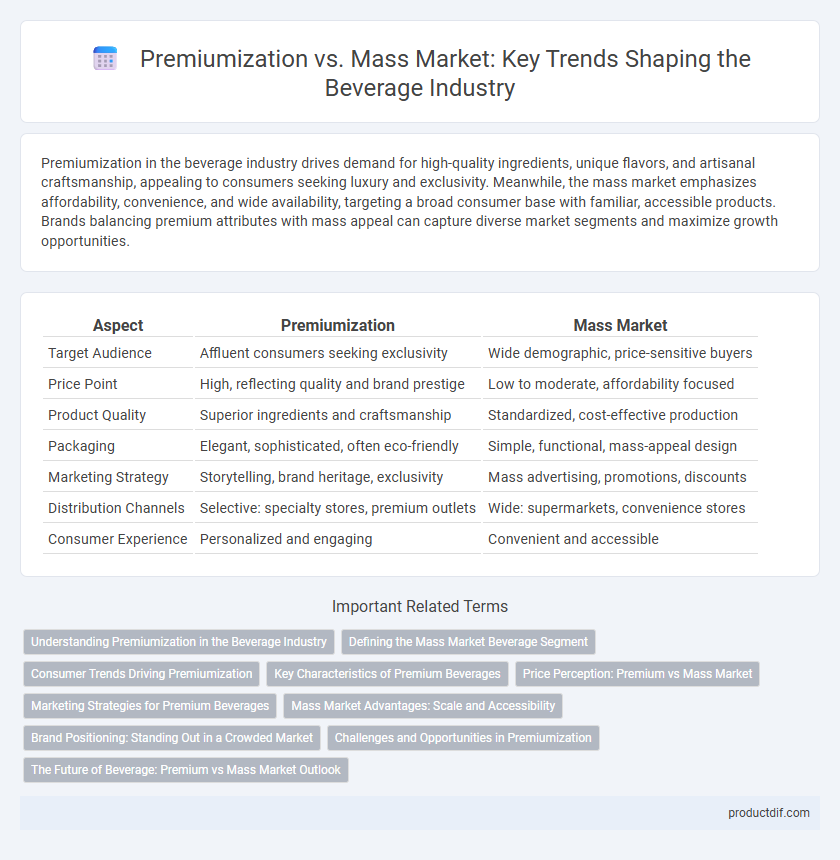Premiumization in the beverage industry drives demand for high-quality ingredients, unique flavors, and artisanal craftsmanship, appealing to consumers seeking luxury and exclusivity. Meanwhile, the mass market emphasizes affordability, convenience, and wide availability, targeting a broad consumer base with familiar, accessible products. Brands balancing premium attributes with mass appeal can capture diverse market segments and maximize growth opportunities.
Table of Comparison
| Aspect | Premiumization | Mass Market |
|---|---|---|
| Target Audience | Affluent consumers seeking exclusivity | Wide demographic, price-sensitive buyers |
| Price Point | High, reflecting quality and brand prestige | Low to moderate, affordability focused |
| Product Quality | Superior ingredients and craftsmanship | Standardized, cost-effective production |
| Packaging | Elegant, sophisticated, often eco-friendly | Simple, functional, mass-appeal design |
| Marketing Strategy | Storytelling, brand heritage, exclusivity | Mass advertising, promotions, discounts |
| Distribution Channels | Selective: specialty stores, premium outlets | Wide: supermarkets, convenience stores |
| Consumer Experience | Personalized and engaging | Convenient and accessible |
Understanding Premiumization in the Beverage Industry
Premiumization in the beverage industry emphasizes higher quality ingredients, unique flavors, and sophisticated packaging to cater to discerning consumers willing to pay a premium price. This trend drives innovation and elevates brand perception, distinguishing products from mass-market options that prioritize affordability and volume sales. Understanding consumer preferences for authenticity and craftsmanship is essential for brands looking to succeed in the premium segment.
Defining the Mass Market Beverage Segment
The mass market beverage segment is characterized by high volume sales and affordable price points, targeting a broad consumer base seeking everyday refreshment options. Products in this category prioritize accessibility, consistent quality, and widespread distribution across supermarkets, convenience stores, and vending machines. This segment contrasts with premiumization by emphasizing value and familiarity rather than exclusive ingredients or artisanal production methods.
Consumer Trends Driving Premiumization
Consumer trends driving premiumization in the beverage industry include a growing demand for high-quality ingredients, unique flavors, and sustainable sourcing. Consumers increasingly prioritize health-conscious choices, leading to a rise in organic, natural, and low-alcohol options. The shift towards experiential consumption encourages brands to offer artisanal and craft beverages that appeal to discerning tastes and social status.
Key Characteristics of Premium Beverages
Premium beverages are characterized by high-quality ingredients, unique flavors, and superior craftsmanship that distinguish them from mass-market options. These products often feature elegant packaging, limited editions, and a strong brand heritage that appeal to discerning consumers seeking exclusivity and authenticity. Price points are significantly higher, reflecting the enhanced experience and perceived value associated with premium beverage offerings.
Price Perception: Premium vs Mass Market
Premium beverages command higher price perception due to superior ingredients, unique flavors, and exclusive branding, appealing to consumers seeking luxury and quality. Mass market beverages focus on affordability and accessibility, driving volume sales through competitive pricing and widespread distribution. Price perception shapes consumer expectations, with premium options viewed as worth the investment and mass market products valued for cost efficiency.
Marketing Strategies for Premium Beverages
Marketing strategies for premium beverages center on emphasizing exclusivity, superior quality, and unique sourcing to justify higher price points and attract discerning consumers. Brands leverage storytelling, limited editions, and influencer partnerships to build a strong emotional connection and enhance perceived value. Targeted digital campaigns and experiential marketing events create immersive brand experiences that differentiate premium offerings from mass market products.
Mass Market Advantages: Scale and Accessibility
Mass market beverages benefit from extensive distribution networks that ensure wide accessibility and lower costs per unit, making products affordable for a broad consumer base. High production volumes enable economies of scale, reducing manufacturing expenses and allowing competitive pricing. This accessibility drives consistent demand and market penetration, establishing strong brand presence across diverse demographics.
Brand Positioning: Standing Out in a Crowded Market
Premiumization in the beverage sector drives brands to emphasize quality, exclusivity, and unique flavor profiles, positioning themselves as luxury or artisanal choices. Mass market brands compete by offering affordability, widespread availability, and consistent taste to appeal to a broader consumer base. Effective brand positioning requires highlighting distinctive attributes such as sustainable sourcing or innovative packaging to differentiate in a saturated beverage market.
Challenges and Opportunities in Premiumization
Premiumization in the beverage industry presents challenges such as higher production costs and the need for educating consumers on product value, which can limit market penetration. However, opportunities arise from increasing consumer demand for unique flavors, sustainable sourcing, and artisanal craftsmanship that justify premium pricing. Brands leveraging innovative packaging and targeted marketing can capture affluent segments willing to pay a premium for quality and exclusivity.
The Future of Beverage: Premium vs Mass Market Outlook
The future of the beverage industry is increasingly shaped by the diverging trends of premiumization and mass market offerings, with premium beverages experiencing robust growth due to consumer demand for quality, unique flavors, and artisanal ingredients. Market forecasts indicate that premium segments, including craft beers, specialty coffees, and functional health drinks, will outpace mass market sales driven by innovation and personalized experiences. Major beverage companies are investing heavily in premium product lines and sustainable packaging to capture affluent consumers while maintaining competitive pricing strategies in the broader mass market.
Premiumization vs Mass Market Infographic

 productdif.com
productdif.com